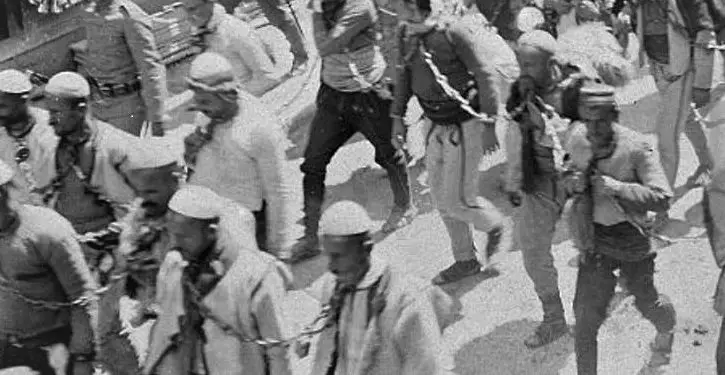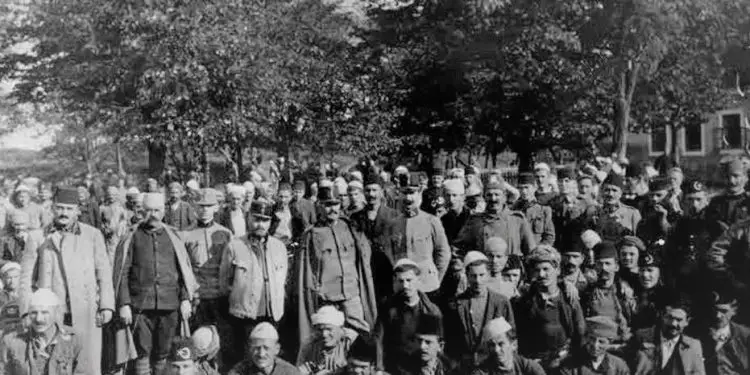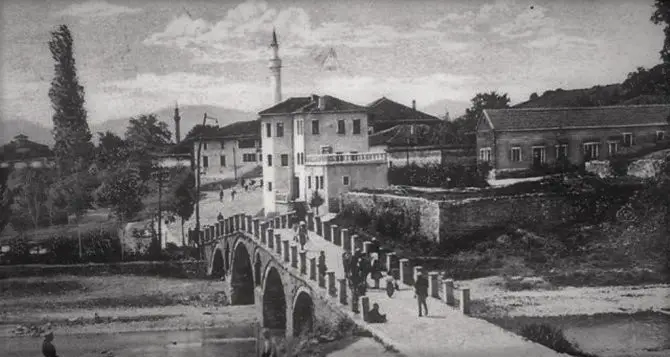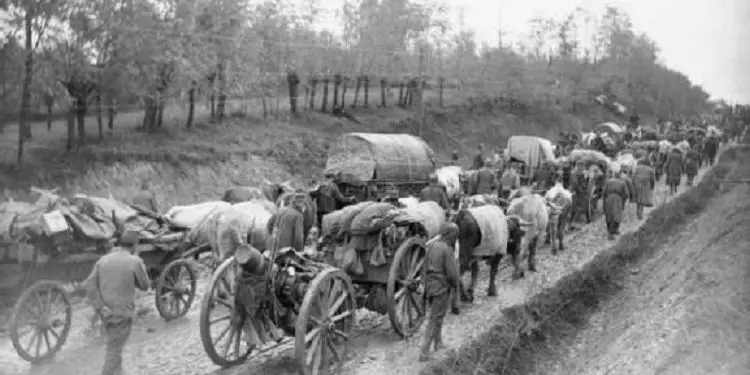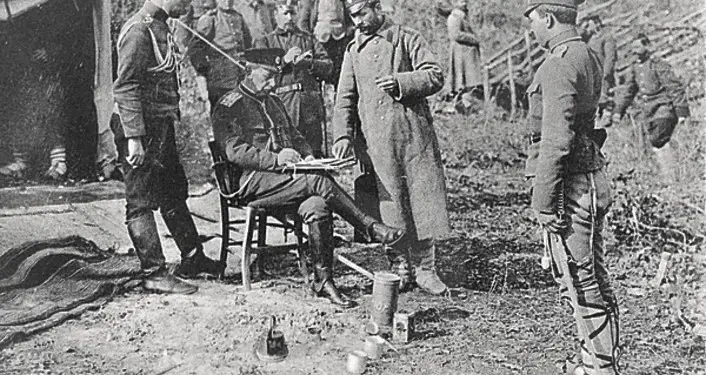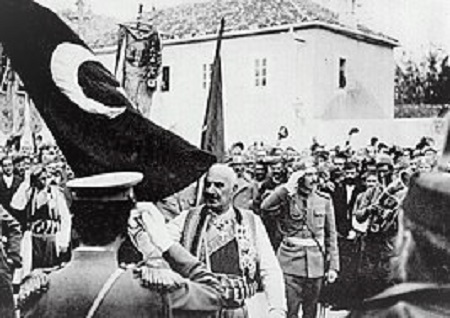From Bashkim Trenova
The fifth part
ALBANIANS ACCORDING TO THE SERBS
(EASTERN CRISIS AND THE BALKAN WARS)
Memorie.al / “Serbs descend from the Slavs, a large number of Slavic tribes that gave life to the people. Knowledge about the origins of the history of the Slavs is modest and not so clear. Their name appears for the first time in the 6th century AD, when Byzantine writers start talking about the Slavs….”! (Dushan Bataković, Milan St. Protic, Nikola Samardžić, Aleksandër Fotic. History of the Serbian People. L’Age d’Homme. Lausanne. 2005. Pg. 3.)
INSTEAD OF THE PROLOGUE – A PROJECT, TWO MEMORANDA AND AN ANALYSIS
The Project or Nacertania of Ilia Garasanin – politician, prime minister of Serbia during the years 1852-1853 and 1861-1886:
Albanians are incapable of forming a state
The most widespread stereotype until the First World War was that Albanians did not want to have their own state, which supported the thesis that they had no right to have one. In 1878, Dimitrije Aleksijevic wrote that; Albanians had the right to form their own state in the west and south of the Drin, but only if they showed that they deserved it morally, because no state was created by thieves and looters.
Jovan Haxhi-Vasiljevic complained that the Albanians had begun to demand independence and were denying the Serbs the right to their land. On the eve of the Balkan wars, Ljuba Jovanović wrote that the existing situation in “Old Serbia” was created by the wild and unrestrained Albanians, whom Istanbul could not calm down; that only Serbia could do this; and that Serbia, by liberating “Old Serbia” would also put an end to the barbaric extermination of the Serbian population.
According to Jovanovic, since jurisprudence did not recognize the right of possession of something acquired by criminal means, Serbia and the Serbian people were right not to recognize the legality of the existing state created by banditry in this famous part of the territory of the Serbian homeland. And while he believed that the Albanians had no right to stay in a country that had been taken by barbaric means, he was not in favor of removing them by force or treating them as a captive and conquered mass.
He accepted that they could remain there as Serbian citizens without losing their nationality; but at the same time, according to him, Serbia had no reason to do this, since jurisprudence did not recognize the right to possess something acquired through criminal means, so Serbia and the Serbian people were right not to recognize the legality of the existing situation created by banditry in that famous part of the Serbian homeland.
The years after the Balkan Wars produced an abundance of books about Albanians, their past and character. Serbia’s main objective was to reach the sea, and now it redirected its expansion from Thessaloniki to Durrës, convinced that this was necessary for its economic and political survival. This policy, to support its plans, needed scientific arguments.
Now it was necessary to spread to the world the old stereotypes about Kosovo and Macedonian Albanians and to create a general picture of Albanians, which would support the argument that they were not capable of having their own state. Serbian nationalist intellectuals, who wrote extensively about the principle of nationhood, the awakening of nations, and how the Balkans belonged only to the Balkan peoples – and who insisted on the right of every nation to be free – never applied these principles to the Albanians, they did not even think that such rights and freedoms could apply to them.
The Serbian struggle for freedom, in the eyes of these authors, had to be rewarded with territories, which were not necessarily and clearly Serbian. While Albanian banditry would be punished, denying Albanians the right to a state even in purely Albanian countries. This is the reason why in this part of the intellectual elite, we do not find any author who has supported the right of Albanians to have their own state. On the contrary, any such request was considered unnatural and an unjust attack on Serbia and its progress.
The desire to prove that Serbia had the right to occupy a part of Albania, to have its coast, was so strong that even serious authors submitted to it. Jovan Cvijic published several articles related to the First Balkan War, aimed at proving Serbian political claims.
Writing that; “Old Serbia” had an outlet to the Adriatic Sea, in a narrow strip between Shkodra, Lezha and Durrës, he defended the construction of a railway line in the direction of this coast. However, he was worried about the fact that this line would pass through areas inhabited by Albanians, that this people’s distrust of communications was known, and that Albanians were also known to be very excitable and easily provoked. The Serbian claims at that time were actually justified not so much by the rights that belong to the Serbs, but by the alleged inability of the Albanians to live as an independent nation.
Jovan Radonič wrote that at the time of the dissolution of the Serbian Empire, the Albanians did not try to create their own state, but continued to live as tribes, not feeling the need for a larger community, thus proving that they did not have the ability to make a nation. And, since these tribes treated everything outside their borders as foreign and hostile, it was not possible to speak of an Albanian people as a whole.
He also argued that the Albanians did not create their own rulers, but remained largely subject to the beneficial effects of Serbian culture, which was interrupted by the Turkish invasion. Protesting against the creation of an autonomous Albania, which would cut off Serbia from the sea, Radonici insisted that he had no Albanian nationality; that the Albanians did not feel the need to have their own state; and that, in any case, they could not form one, since they have not shown the cultural inclination, will and ability to create a state community, preferring to live as they had done since the Middle Ages.
He could not consent that these men, who had always been prone to disorder and violence, and who were the fiercest opponents of equality, should be rewarded with liberty. Instead of being included in the states of the Balkan alliance where, now that Turkey was defeated, they would enjoy, as equal citizens, the benefits of culture and civilization, they are proposed to be independent (Radonic, 1912).
Vladan Gjorgjevic called the Albanians: ‘the red skins of Europe; the Albanian port of Durrës a Serbian port; and the Albanian state that Austria and Italy wanted to create, a sad episode in the bloody but glorious Balkan epic poem. He asked: “Will this great attempt of Austria and Italy to create a state out of these Redskins succeed? And will the colossal damage which the great powers will thus inflict upon themselves be proportionate to the injustice they will do to the Balkan states”?
Arguing that the backwardness of the Albanians was an insurmountable obstacle to the creation of an Albanian state, he called it surprising that these people, who did not know what such a thing was and who thought that snow was sugar – were removed as if now are ready to die for their country.
Although he wrote his book to prove the correctness of the Serbian claim for access to the sea, he also felt the need to emphasize the benefit that Europe would have from the Albanians without their own state, arguing that Albania, being a Muslim state, would be an anachronism for Europe and its ideals. Therefore, according to him, the colonial principle was the only way to solve the Albanian problem, because only a foreign state could establish public order in Albania and create the conditions that would allow Albanians to become a nation.
Asking himself how a people who did not see themselves as a definite nation could henceforth be treated as such and insisting that the Albanians in their development remained at the prehistoric stage, he came to the conclusion that it would be necessary, at least, a hundred years for them to be able to rightly call themselves a nation. In other words, the slogan “The Balkans for the Balkan peoples” did not apply to the Albanians (Gjorgjevic, 1913).
In the same year that Gjorgjevic’s book was published, the Serbian Minister of the Interior, Stojan Protic, published a book with the pseudonym ‘Balkanicus’. Although ostensibly more moderate in tone, this book uses the same arguments and with the same purpose. The book is also published by the same publishing house, which begs the question; if it was a matter of coordinating efforts to serve certain political needs.
The main message of Protić’s book was also that Serbia had the right to claim an outlet to the sea on the Albanian coast. Citing all sorts of “scientific” authorities, Protici argued that; the Albanians of Northern Albania had lost much of their racial purity, as their blood contained a significant Serbian component. He repeated the argument that Albanians did not have a common language or alphabet, nor a popular literature or simply their crafts.
On the other hand, Protiçi mentions a number of foreign authors who had written about the backwardness of Albanians, reaching the conclusion that; they remained at the level they had been a thousand years before. Questioning the failure of neighboring civilizations to influence them and their inability to evolve into a common state, he sarcastically concludes that such a healthy, intelligent and talented nation – as they have left understood some gentlemen – had failed to assimilate any of all the cultures and civilizations of their neighbors, but remained distinct and self-sufficient.
He argued that; Albanians were not capable of an independent national existence, because, being tied to personal will and the freedom of the wilderness; they had and could not have any sense of social freedom.
Their reward for their loyal services to the sultan, according to Protic, was the permission to kill and exterminate the Serbs and to seize their property and land, which was the only talent of the Albanians. In order to strengthen his political position in advance, he sought to find in religious belief the reasons for the deterioration of relations between Serbs and Albanians, who, according to him, were good before they became Muslims:
Even in this war, we saw that only the Muslim Albanians fought against the Serbs, while the Christian Albanians welcomed the Serbs, almost everywhere, as liberators.
Protiçi argued that no Albanian issue had existed before others raised it, since Albanians were not looking for a state for themselves. Austria’s ardent defense of the lowest and most uncultivated race of the Balkan Peninsula, which had proved incapable during the last two thousand years of going beyond tribal life or of establishing even a small state—and her demand, in accordance with the so-called principle of nationality, for extended boundaries for this race at the expense of the Serbian race, stronger, more cultured, and much better suited to state life, was really only an alibi for its territorial expansion. (Balkanicus, 1913).
The main argument in the Serbian writings of the beginning of the century was that; Albania was not a product of the national aspirations of the Albanians and that it lacked the necessary conditions for an independent life, because the Albanians were not united nationally. The state that was being created was not created for them, but as a way to turn the Balkan Peninsula into a colony of Greater Germany (Cemovic, 1913). The idea of independence could not have arisen among the Albanians themselves, but was the work of others. In this independent Albania, no Serb, Christian or even Turk could survive (Jasha Tomiç, 1913). It was also said that the Serbian army could have taken the area around Vlora without a fight.
Albanian character
However, some of these writers were ambivalent about the character of the Albanians. Even those, who usually painted the Albanians in the darkest colors, when they came into direct contact with them during their travels, also recognized their many positive sides, which they sometimes even exalted over the Serbs. Thus, the traveler Ivan Ivanic described the Albanians of Kaçanik as tall, handsome men, known for their bravery, whose love songs were very emotional, as their strong southern blood made them passionate lovers.
According to him, friends were completely protected in their homes and women invulnerable (Ivanic, 1903). Haxhi-Vasiljevici appreciated their diligence. He declared that their fields and vineyards were of the best quality; that they were the best in husbandry and the best artisans; that when they had enough to live on, they were peaceable and good neighbors, even trusted friends; that they were healthy and resilient; that they didn’t talk much, but liked to show off; that they were proud and liked themselves. (Haxhi-Vasiljevic, 1909).
Stojan Novakovic described them as bony and thin, healthy and hard as flint; but he also complained that they were wild, that they robbed and killed every Serbian peasant they met (Novakovic, 1906). Jasha Tomic acknowledged their military prowess, saying that they were extremely skilled warriors and no one could accuse them of cowardice; that they did not attack women and was very hospitable (Tomiç, 1913).
Although he did not consider them eligible for citizenship, Toma Oraovac recognized that they were natives of the Balkans and one of its most cultured and advanced peoples; while Dragisha Vasič argued that they were extremely more honest and humane than the Bulgarians – which is understandable in a book about the Bulgarians (Vasič, 1919).
Interest in Albanians faded quickly after the formation of the Yugoslav state. They were mentioned in writing only incidentally, negatively, of course, but no longer as the main subject of interest or, as the main enemy. This role was taken by the Croats, who first replaced the Bulgarians and then the Albanians. (1)
1 – Excerpt from “‘U tradiciji nacionalizma ili stereotipi srpskih intelektualaca XX veka o “nama” i “drugima”. (In the traditions of nationalism or stereotypes of Serbian intellectuals about “us” and “others”)’, Ogledi n°1 , Helsinki Committee for Human Rights in Serbia, 2002, reprinted by Pescanik (Hourglass) of Radio B92. Peščanik.net, 17. 07. 2008. Memorie.al





